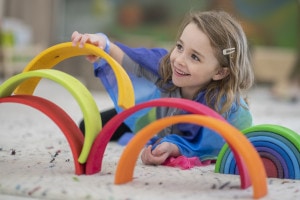Most parents aim to raise their children to be kind, courteous, successful, and independent adults. We can develop independence by raising children to be critical thinkers. Good critical thinking skills allow us to make informed decisions, problem solve, communicate, collaborate with others, and plan and set goals.1
Critical thinking is also associated with higher educational achievement. It is a significant element of emotional intelligence linked with many benefits like resilience, increased positive and reciprocal relationships, better emotional regulation, and increased general quality of life.2
So What is Critical Thinking?
Although research tells us how integral critical thinking is, there is less agreement about one set definition.3 A couple of key definitions identify critical thinking as purposeful, goal-oriented, and well-reasoned and help direct the thinking required to solve problems and make decisions.4 Alternatively, critical thinking is an investigation where the purpose is to explore a question, problem, or issue and arrive at a hypothesis of how to address or respond to something in a justified way based on the information available.5 That sounds a little complicated, right?
Critical thinking is a set of higher-level skills that allows us to take in new information, process and analyze it, and use it to form ideas and opinions, according to Sally Macaluso, a special education teacher with a master’s degree in curriculum and instruction.
She says critical thinking skills are essential in everyday life and help everyone make informed decisions, problem-solve, and set goals. Critical thinking skills also shape how we collaborate and communicate with our peers. And the best time to help instill these vital skills is early childhood. Parents and caregivers can encourage critical thinking in children and raise them to be critical thinkers in several ways.
Ways to Encourage Critical Thinking in Children
Research indicates that children can become critical thinkers if parents or other primary educators prioritize open-ended play. Children can also learn to think critically if they have the opportunity to problem-solve and experiment, ask questions and investigate, make their own choices (within reason), self-reflect, and set goals. It also helps if parents model critical thinking themselves.6,7,8
This means sometimes going against forms of traditional parenting, like the kind millennials grew up with — blind obedience to authority and our parents no matter what. This type of parenting stifles critical thinking. Macaluso says, “Some may feel it is good for children to follow the orders of their parents and authority figures without question. However, it can lead to children blindly following the ideas and suggestions of negative influences too, without considering the consequences.”
Consequences of following authority without question include being more susceptible to giving in to peer pressure, she says. In other words, you can raise your child to be a critical thinker by teaching them the art of debate.9
Create a ‘Yes’ Space
A more concrete way to create an environment that welcomes questions and investigations is creating a “yes” space in your home. Our son has been in Montessori school since he was 18 months old, and their ideology is to follow the child and let them follow their interests to help them become independent. One way to foster independence is by creating “yes” spaces. This means creating safe spaces in your home where they cannot injure themselves.
You can create a place where it’s okay if they make a mess, and they can be left to their own devices to learn. This environment instills critical thinking skills because it welcomes questions and investigations.
Encourage Independent Play
Another way to encourage critical thinking in children is to allow your kids time to play independently. This is what parents in the 1980s and 1990s did right, whether they meant to or not. Children participating in independent play consistently throughout childhood become creative problem solvers10, and it helps them discover the value of evidence-based reasoning and higher-order cognitive skills, which are essential qualities to be a critical thinker.
Sergio Pellis, a researcher at the University of Lethbridge, told NPR that, “The experience of play changes the connections of the neurons at the front end of your brain.”11 He added that the changes in the “prefrontal cortex” during childhood “rewire” the brain and help children learn to regulate emotions, make plans, and solve problems.
Further, according to a study published on the American Psychological Association website, there’s evidence that play promotes critical problem-solving skills, which is another crucial skill to have to be a critical thinker.12
To raise your child to be a critical thinker, it’s crucial to model critical thinking behaviors for them, allow for a lot of free and independent play, and, as hard as it may be, let them question authority a bit—within reason. All the hard work and challenging parenting moments will be worth it in the long run when your kids are healthy, happy adults with superb critical thinking skills.















